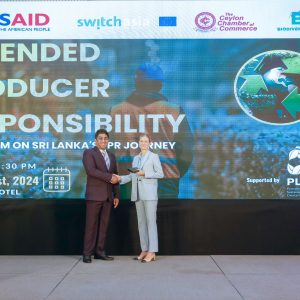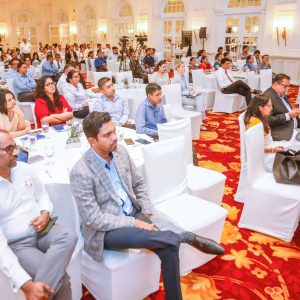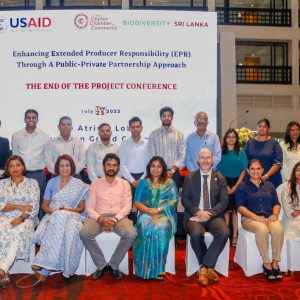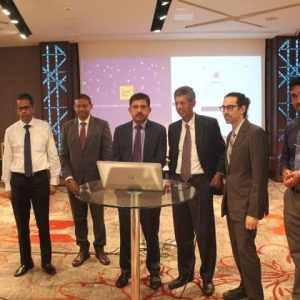Extended Producer Responsibility
The Extended Producer Responsibility (EPR) Project, led by the Ceylon Chamber of Commerce in collaboration with Biodiversity Sri Lanka, with support from USAID’s Clean Cities Blue Ocean (CCBO) programme, aimed to tackle Sri Lanka’s growing plastic waste management challenge. Focusing on establishing a framework for the responsible collection and recycling of plastic waste by manufacturers, importers, and brand owners, in 2021 the project developed the EPR Roadmap, providing a strategic plan for plastic waste management in the country. The implementation of the Mandatory Reporting and Collect-Back (MRCB) model was recommended under this roadmap. The implementation of this model aligns with global EPR legislation, which aims to mitigate the environmental risks associated with single-use plastic waste by holding plastic manufacturers, importers, and brand owners accountable for the end-of-life management of plastic packaging.
Guided by a high-level multi-stakeholder Project Steering Committee co-chaired by the Secretary to the Ministry of Environment and the Secretary General of the Ceylon Chamber, throughout its implementation, the project achieved several milestones.
- 1,586 metric tons of plastic waste safely managed exceeding the original target of 488 metric tons by 325%
- 1,586 metric tons of plastic material reduced or recovered, surpassing the target of 953 metric tons by 166%, diverting a significant volume from the environment
- Introduced the ‘Mandatory Reporting and Collect-Back Model’, encouraging companies to report plastic usage and commit to recycling a significant percentage of their plastic waste, aiming for near 100% collection over five years.
- Two private sector-led consortia were formed under the aegis of the Ceylon Chamber, for PET and HIPS plastics, involving private sector companies to collaborate on collection efforts.
- An online Plastic Waste Reporting System was established, providing real-time tracking of corporate collect-back targets. https://www.epr.lk
- 12 Material Recovery Facilities (MRFs) were set up nationwide, with an additional 8 MRFs under construction and 10 more in the planning stages.
- The project partnered with informal waste collectors, enhancing plastic collection and aggregation methods to increase efficiency.
- Capacity-building workshops were held, training over 500 collectors and recyclers across Colombo, Gampaha, and Kalutara districts.
- A Pricing Analysis of Post-Consumer Plastics was conducted, developing a standard pricing mechanism to incentivise the collection and recycling of plastic waste.
- Hosted the first-ever National Symposium on Extended Producer Responsibility, in collaboration with Biodiversity Sri Lanka.
By the end of the project, the MRCB model had been successfully piloted, with several companies actively reporting their plastic waste collection and recycling through the online system. The initiative laid a strong foundation for sustainable plastic waste management in Sri Lanka, and upon completion, the project was handed over to the Central Environmental Authority (CEA) to manage, ensuring its continuity and impact at a national level.



